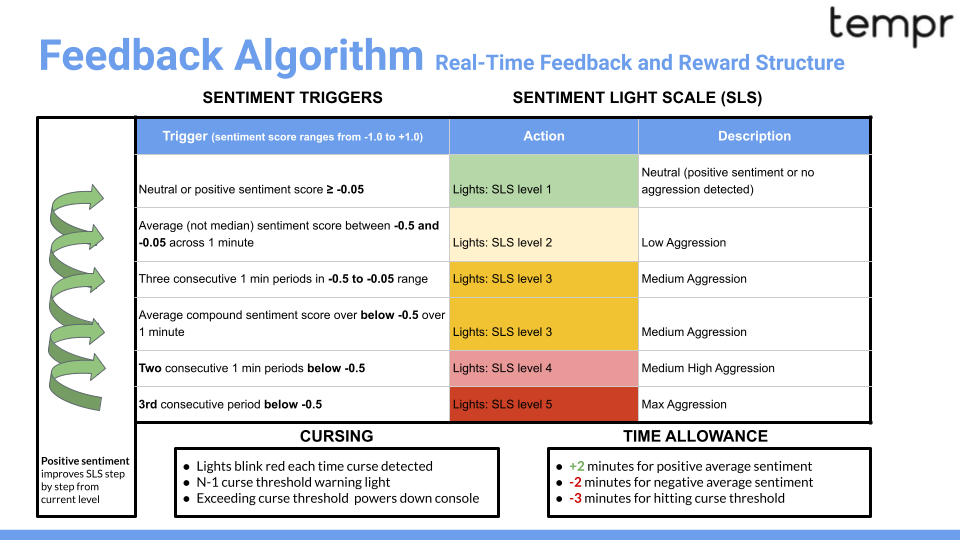Tempr
Project Details
| Course | Other Team Members | Language(s) |
|---|---|---|
| Hardware/Software Lab (TECHIN 514) | Natalia Stepanova, Ross Todrzak, Michael Cross | Python, SQL, Node.js |
PETRA 2021
This project has been accepted to the PETRA Conference 2021: The 14th PErvasive Technologies Related to Assistive Environments Conference.
The project also won Best Demo Paper Award at PETRA 2021.
My Role
For this project, I was responsible for the software aspect of the project as shown below. This included the integration of Google’s NLP API, VADER’s Sentiment Analysis library, Azure’s SQL Database & Server, the weighted feedback algorithm and lastly connecting & setting up of IFTTT.

Introduction
Cyberbullying during multiplayer video game sessions leads to negative impacts in adolescents like lower self-esteem, poor grades, and poor relational patterns. Unfortunately, cyberbullying has been on the rise now more than ever due to COVID-19 drawing more kids to digital platforms for extended periods of time.
Tempr functions as an awareness tool for both parents with young gamers and for early adolescents. The goal is to minimize verbal aggression and explicit language while helping children and parents recognize inappropriate behavior during gameplay.
2020 Video Game Industry Report
Problem Definition
Aggressive behavior triggered by stressful situations in which people have little to no control can be very difficult to mediate. Recurring aggressive behavior may have long-term consequences such as irritability, restlessness, and an impact on an individual’s mood and/or relationships.
COVID-19 forced people to search for available social outlets during times of lockdown and social distancing, allowing video game playing to hit all-time peaks in usage and popularity among family and friends. Where there are gamers, there is, naturally, an abundance of “toxic” gamers, who may show aggression towards teammates. Constant harassment from these toxic players can furthermore cause depression in others playing with them.
Solution
The current implementation of Tempr measures how toxic a player is towards others and provides real-time feedback via smart home LEDs mounted behind a TV as well as a time management function that increases or decreases gaming time based on previous positive/negative behavior. Parents can also configure a list of bad words they don’t want their child(ren) saying and Tempr will track if the words are used, again providing real-time feedback and longer-term consequences.
The technology behind Tempr can be integrated to games for more feedback options such as providing players with in-game currency for positive behavior and putting a player on time-out for a set duration once they reach a certain threshold.
Ultimately, we hope to discourage children from expressing aggressive behavior towards other players (either through their own self-awareness or through parental oversight) and reduce toxicity in gaming environments.
While our primary focus group for this tool is gamers, there could be a much wider range of applications for Tempr. This solution could prove useful during serious arguments between couples and family members, and even help drivers become aware of road rage situations. This technology could further provide aggression awareness in elderly care facilities where residents have difficulty communicating, as well as child daycare’s and schools.
Code Breakdown


